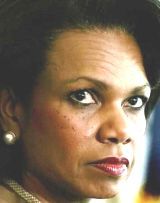Rice uses carrot and stick on Sudan
EL-FASHER, Sudan, July 21 (AFP) — US Secretary of State Condoleezza Rice scolded Sudan’s government Thursday for failing to end bloodshed in the troubled region of Darfur but signaled a possible easing of US sanctions on humanitarian grounds.
 In her first trip to the sprawling African country, Rice had a round of talks with Khartoum leaders, demanded and got an apology for a dustup between her entourage and Sudanese security men, and visited battered Darfur.
In her first trip to the sprawling African country, Rice had a round of talks with Khartoum leaders, demanded and got an apology for a dustup between her entourage and Sudanese security men, and visited battered Darfur.
US officials said Rice made clear Washington would not improve ties with Sudan without a resolution of the crisis in Darfur, where up to 300,000 people have died in 29 months of fighting branded by Washington as genocide.
“I told them they had a credibility issue,” Rice said of her talks with President Omar al-Beshir, Vice President John Garang and Foreign Minister Mustafa Osman Ismail.
“I told them there’s a gap between what they’ve said and what they’ve done” she said.
But US officials reported little Sudanese enthusiasm for Rice’s firm appeals to disarm the pro-government Janjaweed militia operating in Darfur.
One official, who asked not to be named, quoted Beshir as trying to turn the tables on Rice by contending: “If you only disarm one side in the conflict the result is going to be genocide.”
More than two million people have been left homeless by the Darfur conflict and violence against women has been widespread.
Still Rice took heart in the formation of a national unity government in Sudan this month under the terms of a peace agreement signed in January that ended 21 years of civil war between Khartoum and southern rebels.
“The new Sudanese government needs to take this as an opportunity to make a new start,” she said.
Sudan has been on the United States’ list of terror sponsors since 1993 and the target of eight-year-old US economic sanctions that Khartoum pressed Rice to ease or lift.
US officials said the Sudanese were looking for spare parts for US-built railroads to help speed food aid around the country. They are also seeking to buy or lease aircraft to transport displaced people.
During a series of broadcast interviews at the Abu Shuk camp for displaced people in Darfur, Rice said she would have to take the matter under review but signaled she was open to the argument.
“Obviously if there is a case on the humanitarian side, I think we’d be willing to look at it,” she told the US National Public Radio.
Rice also made a point of visiting with Darfur women victimized by violence. US officials said she extracted a commitment from Khartoum to make a serious effort to address the issue.
But much of Rice’s day in Sudan was overshadowed by a showdown between security guards and US officials and press who were initially barred from her meeting with Beshir at his residence.
“It was unacceptable and outrageous,” Rice later said.
Her senior adviser, Jim Wilkinson, said he was thrown against a wall at the building’s entrance before he bulled his way through with the secretary’s personal assistant in tow behind.
“We don’t appreciate being manhandled at the front door,” a livid Wilkinson told reporters. “Diplomacy 101 says you don’t rough your guests up, especially the press.”
Connie Newman, assistant secretary of state for African affairs, was excluded from the meeting at the start as were other American officials and Rice’s personal translator.
An American radio reporter needed the help of Rice’s spokesman Sean McCormack to fend off Sudanese attempts to snatch the microphone off her recorder.
A television correspondent was shoved when she tried to ask Beshir about Darfur during what was billed as a photo opportunity. “Don’t you ever touch our journalists again,” bellowed Wilkinson.
The Sudanese relented and let two waves of US reporters into the meeting room and dispatched the head of their US mission to apologize for the earlier incidents. But Rice still fumed.
“They had no right to manhandle my staff and the press,” she told reporters on the plane taking them to Darfur. “It makes me very angry to be sitting there with their president and have this happen.”
Rice demanded a government apology before her plane landed in Darfur. She said by the time she touched down, she had Ismail on the phone expressing his regret and promising those responsible would be “dealt with.”
